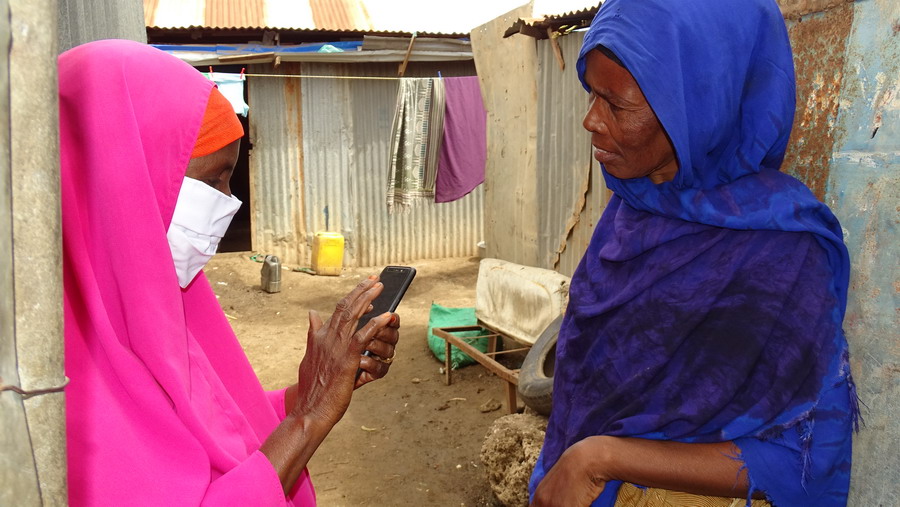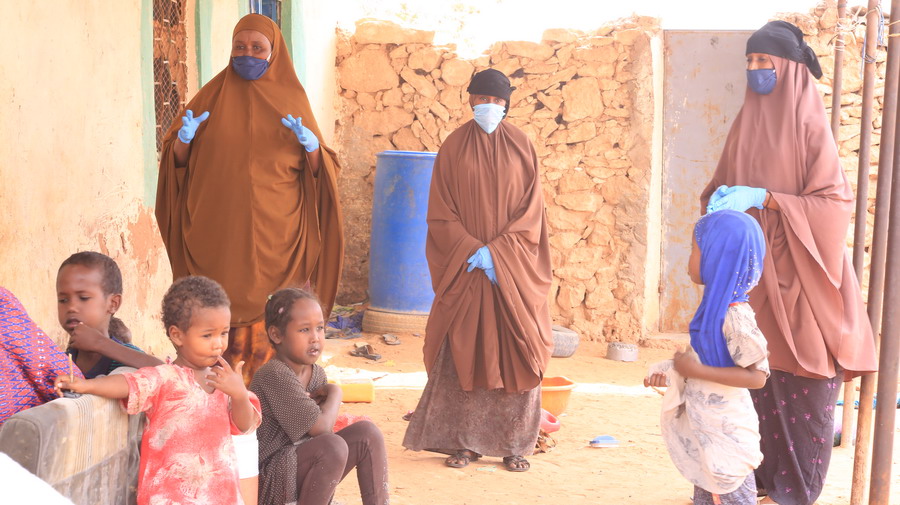
8 March 2021 – Compassion. Service. Empathy. These are a few qualities that resonate with doctors and health workers around the world, and in Somalia. In Mogadishu, armed with these qualities, Dr Naima Abdulkarim, Public Health Emergency Officer for the World Health Organization (WHO) in Somalia, is braving several challenges to follow her dream to serve her community.
“My mother worked as a nurse, and every time I saw her help children and women in our village, I used to say, ‘Mom, I want to be like you,’” said Dr Naima, who joined WHO Somalia in May 2019.
Since then, she has been working closely with her team members, Government counterparts and other partners to prepare for and respond to health emergencies in the country.
Making a difference in the fight against COVID-19
Around a year ago, since the first case of coronavirus disease (COVID-19) was confirmed in Somalia, Dr Naima has been working at an isolation centre at the De Martino Hospital in Mogadishu. Her work includes providing support to the Federal Ministry of Health teams in conducting COVID-19 tests, contact tracing, capacity-building and case management. She is also supporting infection prevention and control efforts, collecting data and raising awareness of diseases like COVID-19 among the community.

Dr Naima feels fortunate that she gets to live her dream every single day at work. One day, she explains, she received a call from one of the local community health workers supported by WHO and the Federal Government. The health worker informed her about a person – Mohamed*- who had some recent travel history, and was presenting with signs and symptoms of COVID-19 in a village.
Unfortunately, Mohamed and his family hid from the community health worker, as they didn’t believe in COVID-19 and insisted it was just a common cold.
Even though most routes to the village were closed due to security issues, Dr Naima set out to meet Mohamed. Covered with her personal protection gear, including a face mask and hand gloves, and with help from the local community, Dr Naima visited Mohamed’s family. From a safe distance, she explained to them the effects of COVID-19 and how to prevent it. She also explained how isolation could help them all from spreading the disease if it was indeed COVID-19. After a while, the family understood her message, and allowed Dr Naima to admit the patient in the isolation centre. After 3 days, Dr Naima received a call from Mohamed’s family – 2 more of their family members had similar symptoms that were not too serious. Now that they knew better, they managed to isolate themselves at home, they explained.
When she checked on them after a few days, Dr Naima was pleased to note that Mohamed and his family members had recovered well and had avoided any further spread of the disease.
Standing tall in the face of stereotypes
Dr Naima’s professional life doesn’t come without personal challenges. As she studied or discussed her ambitions, people were always trying to convince Dr Naima to change her mind about becoming a doctor.
“I have had to face a lot of questions and comments from people, like, ‘A woman will never be able to survive such a terrible emergency,’ or, ‘This is a man’s job,’” says Dr Naima, beaming as if to show she has proved them all wrong.
Her passion for humanitarian work and helping her community has kept her strong and dedicated over time.
“If there was one thing I could change about my country,” says Dr Naima, “I would change people’s belief that women cannot learn and cannot do everything, because we can. We can do anything we put our hearts into, no matter where we live.”
The World Health Organization for Somalia applauds all Somali female health workers for their dedication and the role they play in improving community health across the country.
** Mohamed is not his real name

8 March 2021 – Compassion. Service. Empathy. These are a few qualities that resonate with doctors and health workers around the world, and in Somalia. In Mogadishu, armed with these qualities, Dr Naima Abdulkarim, Public Health Emergency Officer for the World Health Organization (WHO) in Somalia, is braving several challenges to follow her dream to serve her community.
“My mother worked as a nurse, and every time I saw her help children and women in our village, I used to say, ‘Mom, I want to be like you,’” said Dr Naima, who joined WHO Somalia in May 2019.
Since then, she has been working closely with her team members, Government counterparts and other partners to prepare for and respond to health emergencies in the country.
Making a difference in the fight against COVID-19
Around a year ago, since the first case of coronavirus disease (COVID-19) was confirmed in Somalia, Dr Naima has been working at an isolation centre at the De Martino Hospital in Mogadishu. Her work includes providing support to the Federal Ministry of Health teams in conducting COVID-19 tests, contact tracing, capacity-building and case management. She is also supporting infection prevention and control efforts, collecting data and raising awareness of diseases like COVID-19 among the community.

Dr Naima feels fortunate that she gets to live her dream every single day at work. One day, she explains, she received a call from one of the local community health workers supported by WHO and the Federal Government. The health worker informed her about a person – Mohamed*- who had some recent travel history, and was presenting with signs and symptoms of COVID-19 in a village.
Unfortunately, Mohamed and his family hid from the community health worker, as they didn’t believe in COVID-19 and insisted it was just a common cold.
Even though most routes to the village were closed due to security issues, Dr Naima set out to meet Mohamed. Covered with her personal protection gear, including a face mask and hand gloves, and with help from the local community, Dr Naima visited Mohamed’s family. From a safe distance, she explained to them the effects of COVID-19 and how to prevent it. She also explained how isolation could help them all from spreading the disease if it was indeed COVID-19. After a while, the family understood her message, and allowed Dr Naima to admit the patient in the isolation centre. After 3 days, Dr Naima received a call from Mohamed’s family – 2 more of their family members had similar symptoms that were not too serious. Now that they knew better, they managed to isolate themselves at home, they explained.
When she checked on them after a few days, Dr Naima was pleased to note that Mohamed and his family members had recovered well and had avoided any further spread of the disease.
Standing tall in the face of stereotypes
Dr Naima’s professional life doesn’t come without personal challenges. As she studied or discussed her ambitions, people were always trying to convince Dr Naima to change her mind about becoming a doctor.
“I have had to face a lot of questions and comments from people, like, ‘A woman will never be able to survive such a terrible emergency,’ or, ‘This is a man’s job,’” says Dr Naima, beaming as if to show she has proved them all wrong.
Her passion for humanitarian work and helping her community has kept her strong and dedicated over time.
“If there was one thing I could change about my country,” says Dr Naima, “I would change people’s belief that women cannot learn and cannot do everything, because we can. We can do anything we put our hearts into, no matter where we live.”
The World Health Organization for Somalia applauds all Somali female health workers for their dedication and the role they play in improving community health across the country.
** Mohamed is not his real name











